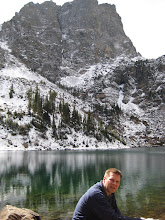(Note: I wrote this column back in 2003 for the Wausau Daily Herald. I liked it, so I'm posting it here.)
What happened to Father
Rene Menard?
Only God knows for sure.
Menard was a French priest, one of the first Europeans to walk and
explore the wild land that would become Wisconsin. He spent his days in
the middle 1600s doggedly spreading the word of his God to the native
people of North America. But the end of his story is shrouded in fog.
Some historians from Lincoln County think the pioneering priest may
have gone missing somewhere north of Merrill in July 1661. In 1923, the
Merrill Council of the Knights of Columbus erected a monument to Menard
at the top of Nine Mile Hill on Highway 107 between Merrill and
Tomahawk, using a granite obelisk to forever claim the explorer as their
own.
The memorial's brief and tantalizing inscription, carved in simple
block letters, reads: "In honor of Pere
Rene
Menard. Born at Paris Sept. 7th, 1605. Entered the Jesuit order
Nov. 7th, 1624. Sailed for Quebec in March 1640. Lost hereabouts in July
1661, while en route to Huron village to baptize Indian refugees."
Not to be critical of the good folks of the 1923 Merrill Council of
the Knights of Columbus, but this inscription raises more questions than
it answers.
Lost? How? Why? Did he forget his compass? And "hereabouts" simply
isn't specific enough for me. I've stopped at the monument numerous
times, and on each visit, I am tempted to take a hike in the woods to
look for a skeleton or an ancient cross.
It just so happened that the last time I stopped at the monument
(along with my wife on the way back from a sojourn in Minocqua, because
she goes nuts over roadside monuments), I happened to have a book in my
truck entitled "Wisconsin River of History," by William F. Stark.
This is a 354-page tome, but it devoted just three midsize paragraphs
to the beloved Father Menard. Unfortunately, those three paragraphs
just deepened the mystery.
Stark writes that Menard was "not in the best of health," and
traveled to Wisconsin to "minister to some of his former converts who
had been residing in the eastern part of Canada but had been forced west
by the fierce Iroquois and were now located on the south shore of Lake
Superior."
Menard was near some rapids at the headwaters of the Black River when
he stepped ashore to lighten the canoe, Stark maintains. He never
returned to the river, and several years later Menard's cassock was
discovered in the possession of some Sioux Indians.
That just begs the question: The Black River? That's really not
anywhere "hereabouts" of the monument, unless you draw a wide circle on
the map.
Because of the incongruity of the monument and Stark's account, I
turned to another resource, a book simply and elegantly entitled
"Wisconsin," which I found in the back corner of the Wausau Daily Herald
library. This five-volume resource, edited by Fred L. Holmes, and
published by The Lewis Publishing Co. of Chicago in 1946, dedicated
nearly a page to Menard.
"Though broken and infirm from twenty years of labor in the Canadian
wilderness, he welcomed the opportunity to go as a missionary to the
distant tribesmen," the book said.
Menard traveled from Quebec, said Holmes, with seven French fur
traders. They weren't kind men.
"Menard, according to the Jesuit chronicle, suffered neglect and
abuse from his traveling companions," Holmes mentions.
He made it to what is now Ashland, Holmes said, where he devoted
himself to preaching to Indians.
During the summer of 1661, he set out inland with one French guide to
find a band of Hurons who were starving. On his return, the guide said
he became separated from the wilderness priest. Holmes conjectures that
Menard disappeared on the Jump or Yellow River in what is now Taylor
County.
Did Menard simply keel over while relieving himself in the woods? Or
was he set upon and murdered? Was he on the Wisconsin, Jump, Yellow or
Black River?
We'll probably never know, said Alice F. Krueger, 74, a vice
president of the Merrill Historical Society. But Krueger said there are
many who are convinced that Menard walked on Lincoln County soil. A rock
with a cross carved in it was found in northeast Lincoln County, and
that sent intrepid historians out with metal detectors to find some
Menard artifact. Nothing was ever found.
OK, so maybe Menard didn't disappear near the monument on Highway
107. But standing there, on top of the hill, looking at the green
forests to the north, it's easy to imagine a man of God walking along,
listening to the wind in the trees, preparing to meet his maker.
